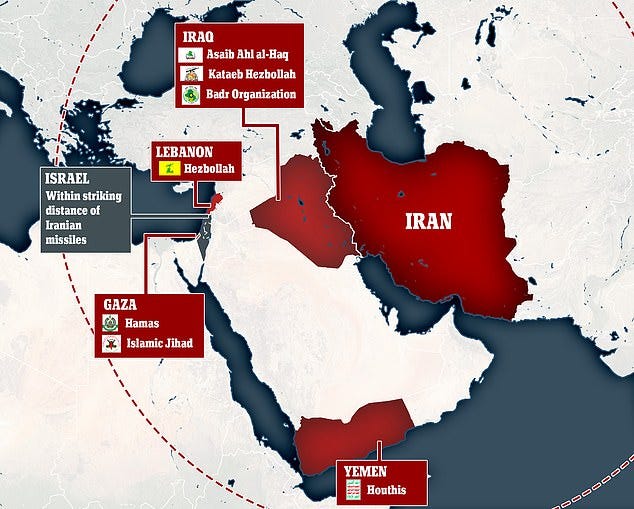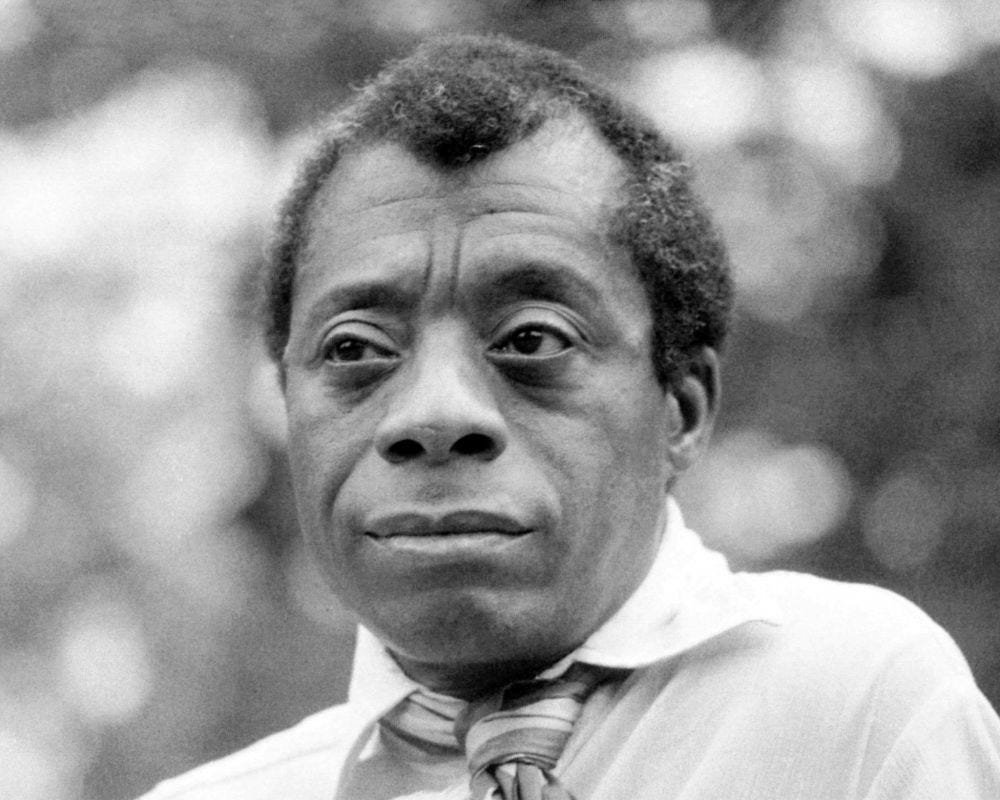
“The US anticipates Iran’s so-called ‘axis of resistance’ to take the lead in retaliating against Israel for assassinations in Tehran and Beirut, a move that could signal Iran wants to de-escalate tensions but also injects a new layer of uncertainty to US war gaming. The US is particularly on alert to Iran’s proxies from Yemen, Iraq and Lebanon carrying out coordinated attacks on Israel, a US official told Middle East Eye, adding that the US is combing signals intelligence and conducting cryptographic analysis to see how the groups are organising themselves. ‘Iran’s proxies are expected to play a more prominent role in this retaliation than April’s attack,’ a former senior US official familiar with the administration’s thinking told MEE. ‘We could get into a situation where the tit-for-tat is more unpredictable with tertiary effects for US partners’ … While the attacks have plunged the region into uncertainty, the Biden administration does have a model to replicate as it girds for Iran's response. In April, the region was also on the brink, after Israel bombed Iran’s consulate in Damascus. The strike was seen as a direct attack on Iranian sovereign territory and distinct from the recent assassinations that didn't target Iranian nationals. In a joint effort with Jordan and the UK, the US shot down almost all of the 300 missiles and drones Iran fired at Israel. It then convinced a resentful Israel to respond with a small drone strike on Isfahan. ‘The [April] attack was largely seen as a humiliation in Iran because it was foiled so successfully by the US,’ Merissa Khurma, director of the Middle East programme at the Wilson Center, told MEE. Iran telegraphed its retaliation days in advance and warned the US’s Arab Gulf partners about an incoming attack on Israel, which likely helped the US and Israel prepare. The backchannels to Gulf states appear to be kicking in again. Iran’s acting Foreign Minister Ali Bagheri has spoken with his Saudi, Omani and Qatari counterparts. But there are also signs that Iran’s last strike on Israel may have been too choreographed and calibrated. ‘We are looking for a real response, not a performative response, and for real opportunities,’ Nasrallah said on Thursday. Khurma said that Washington felt vindicated by its handling of April’s flare-up. ‘There is a little sense of riding it out this time,’ Khurma said. ‘But they need serious backchannel diplomacy to avert a regional war.’” (Sean Matthews/Middle East Eye)
“A turning point came on June 25, when a group of C.I.A. officers sat across from their Russian counterparts during a secret meeting in a Middle Eastern capital. The Americans floated a proposal: an exchange of two dozen prisoners sitting in jails in Russia, the United States and scattered across Europe, a far bigger and more complex deal than either side had previously contemplated but one that would give both Moscow and Western nations more reasons to say yes. Quiet negotiations between the United States and Russia over a possible prisoner swap had dragged on for more than a year. They were punctuated by only occasional glimpses of hope for the families of the American prisoners — including Evan Gershkovich, a reporter for The Wall Street Journal, and Paul Whelan, an American security contractor — growing increasingly impatient for their ordeal to end. Those hopes were always dashed when one of the two sides balked. But the June meeting changed things, according to accounts from American and Western officials and other people familiar with the long process of bringing the deal to fruition. The Russian spies took the proposal back to Moscow, and only days later the C.I.A. director was on the phone with a Russian spy chief agreeing to the broad parameters of a massive prisoner swap. On Thursday, seven different planes touched down in Ankara, Turkey, and exchanged passengers, bringing to a successful close an intensive diplomatic effort that took place almost entirely out of public view. The deal between longtime adversaries — negotiated mostly by spies and sometimes through secret messages hand-delivered by couriers — secured the release of Mr. Gershkovich, Mr. Whelan and 14 other imprisoned Americans, Russians and Europeans. The deal also freed, among others, a Russian hit man, Vadim Krasikov. He had been jailed in Germany since 2019 for the murder of a Chechen former separatist fighter in a park in Berlin. He was the prize most sought by President Vladimir V. Putin of Russia, who had publicly praised the killing as an act of patriotism and for years had insisted that Mr. Krasikov be part of any swap … American officials on Thursday insisted that the prisoner swap was by no means the advent of a new détente between Washington and Moscow. Instead, they maintained, it was a deal driven by cold calculations of national interest, a deal in which every side got something it wanted.” (NYT)
“Killer Vadim Krasikov, released in a prisoner exchange between the West and Russia, is close to President Vladimir Putin. Krasikov could have been Putin's bodyguard in the 1990s, according to The Wall Street Journal. Krasikov was serving a life sentence in Germany. Russian officials were trying to return him to Russia for two years. Western intelligence believed that Putin's insistence on Krasikov's return was rooted in their close ties. Presumably, the Russian leader and the killer had known each other since Putin was deputy mayor of St. Petersburg in 1994, and Krasikov was his bodyguard. According to the brother of Krasikov's second wife, he and Putin were so close that they used to go to the shooting field together. Krasikov told the family that Putin was supposedly a good shooter. Krasikov had a luxurious lifestyle, the article says. His wife boasted that her husband often changed cars, Porsche and BMW, and that she did not have time to get used to them. The WSJ notes that the Russian agent earned $10,000 a month and received ‘business trip’ bonuses. Western media earlier reported that Krasikov was a member of the FSB group that worked with the fugitive president of Ukraine Viktor Yanukovych. The special services believe that he could have been a member of a group of snipers who shot at the participants of the Revolution of Dignity (protests in Kyiv in 2014 before the outbreak of the Russia-Ukraine war).” (Oleksandra Bashchenko/WSJ)
“Using AI to predict weather has evolved over the past five years from an academic notion to operational tests at weather agencies in the U.S. and Europe, as well as at companies that provide intelligence to businesses. In May, Microsoft released a forecast tool called Aurora that produces five-day global air- pollution predictions and 10-day weather forecasts 5,000 times faster than existing models run by the National Oceanic and Atmospheric Administration and the European Center for Medium-Range Weather Forecasts. Companies and labs around the country, including Villanova University, the University of Oklahoma and a California startup firm, are training new weather AIs. Faster, more accurate forecasts are becoming ever more important. The world is warming, extreme weather has become more deadly, and storms are more costly. ‘We really need to get the forecasts of the weather really accurate,’ says Remi Lam, a research scientist at Google DeepMind, which introduced an AI-based weather model called GraphCast in November.” (Eric Niiller/WSJ)
“Five days before Donald Trump became president in January 2017, a manager at a bank branch in Cairo received an unusual letter from an organization linked to the Egyptian intelligence service. It asked the bank to ‘kindly withdraw’ nearly $10 million from the organization’s account — all in cash. Inside the state-run National Bank of Egypt, employees were soon busy placing bundles of $100 bills into two large bags, according to records from the bank. Four men arrived and carried away the bags, which U.S. officials later described in sealed court filings as weighing a combined 200 pounds and containing what was then a sizable share of Egypt’s reserve of U.S. currency. Federal investigators learned of the withdrawal, which has not been previously reported, early in 2019. The discovery intensified a secret criminal investigation that had begun two years earlier with classified U.S. intelligence indicating that Egyptian President Abdel Fatah El-Sisi sought to give Trump $10 million to boost his 2016 presidential campaign, a Washington Post investigation has found.” (Aaron C. Davis and Carol D. Leonnig/WashPost)
“Anew study reveals the bioactivity of microplastics in Lake Ontario using cutting-edge nanomembrane filtering technology. Researchers found all samples contained microplastics ranging between 8 and 20 µm. The study is published in the journal Eco-Environment & Health … Microplastics are a significant pollutant present in ecosystems worldwide, including oceans, lakes, and rivers. These particles pose potential health risks due to their persistence and complex composition, which includes various toxic chemicals. Prior research has highlighted the widespread presence of microplastics and their potential impact on human health. Based on these challenges, it is crucial to conduct in-depth studies on the bioactivity of microplastics in environmental samples to assess their health risks. The new study utilized innovative nanomembrane filtering technology to isolate and analyze microplastic-containing debris from Lake Ontario. Researchers collected samples from four locations at different times, using silicon nitride nanomembrane filters to isolate debris between 8 and 20 µm. Nile Red staining confirmed the presence of microplastics in all samples. Cell-based assays assessed cell viability, AhR activity, and IL-6 levels, revealing that while microplastics were consistently present, their bioactivity varied over time … The implications of this research are far-reaching, offering a new methodology for environmental monitoring and health risk assessment. By enhancing our ability to detect and analyze microplastics, the study paves the way for more targeted strategies to mitigate plastic pollution and protect aquatic ecosystems. Moreover, the insights gained could inform regulatory measures and public health policies aimed at reducing exposure to these pervasive contaminants.” (Phys.org)
“Given that The Lord of the Rings is one of the bestselling book series of all time, it shouldn’t come as a surprise that it’s inspired a lot of different groups and movements over the decades, with a wide range of politics. Probably the most influential is Silicon Valley, where the top of Salesforce Tower in San Francisco lights up with the Eye of Sauron on Halloween, executives reference its lore to get their vision across to employees, and companies name meeting rooms — if not their whole business — after objects and people from the books. After J.D. Vance’s selection as Republican vice-presidential candidate briefly put the spotlight on his relationship with Peter Thiel and the Valley’s obsession with Middle-earth, I decided to see how widespread these companies named after aspects of Middle-earth actually are. Unsurprisingly, the dark lord Peter Thiel holds the One Ring to rule them all — or close enough.” (Paris Marx/Disconnect)
“Recently, journalists have been revealing often obscure activities underway in red states that portend an operation to steal the 2024 election. MAGAs are simply refusing to certify the popular vote. The plan apparently is to send in Trump electors in December, no matter what the voters want. Last month, the AP collected incidents from Michigan, Georgia and Arizona, in which Trump-affiliated officials refused to certify, or sued to stop certification, of results they didn’t like. Another ominous report published in Rolling Stone documents at least 15 instances since November 2020 in which local Republican officials in eight states refused to certify election results, ‘a typically routine matter that has become anything but’ in the wake of Trump’s Big Lie. In one example, investigative journalist Justin Glawe recounted how, in a Georgia election, a MAGA official demanded a hand recount, then when the recount failed to change the results, simply walked out of the room ‘and got in his truck’ (of course) to deny the certification process a quorum.” (Nina Burleigh/American Freakshow)
“Donald Trump has been both a missile and a mirror to Black journalists this week. At 9 p.m. Monday, less than two days before its convention opened here, the National Association of Black Journalists announced that the former president would take part in a moderated ‘conversation’ with ABC’s Rachel Scott, Fox News’s Harris Faulkner and Semafor’s Kadia Goba. On Tuesday morning, I stepped down as co-chair of the meeting. I have been asked whether this move was in protest of Trump’s appearance. It was more than that. As I will explain, I objected to the format, which I rightly feared would allow a White politician to make our Black press advocacy organization into an instrument of his agenda. I am a longtime NABJ member and award-winner. I love this community dearly. But I could not be part of the production and promotion of performative, journalistic charades that degrade our communities, and further undermine trust in our profession. I would not participate in a circus that I knew would cause pain to members. The NABJ convention has long been a source of healing and rejuvenation for Black journalists, many of whom save their own funds to attend.Though I would not lend my name to it, I did attend the widely covered session, held in the international ballroom of the Hilton Chicago. Trump blamed his late start on difficulties with the sound system, but while we waited for nearly an hour, I wondered aloud if he had objected to a last-minute plan to fact-check his appearance, announced by NABJ in partnership with PolitiFact. I knew this would amount to spritzing water on a raging dumpster fire. Ultimately, the fact-checking was only on their website and X and not live on TV or in the room. Most importantly, not to Trump’s face.” (Karen Attiah/WashPo)
“When starvation first started to spread in Gaza at the end of October 2023, the international community expressed alarm. The World Food Programme warned that ‘People in Gaza are starving to death right now. The speed at which this man-made hunger and malnutrition crisis has ripped through Gaza is terrifying.’ The EuropeanUnion and the United States released statements urging Israel to open crossings and let in thousands of aid trucks. The argument then was that starvation should never be used as a weapon of war. Palestinians should not be starved for political reasons, or as a mechanism to push them out of Gaza. Israel, as the occupying power, has an obligation to ensure an adequate supply of crucial goods. That was months ago. The humanitarian crisis in Gaza has only gotten worse by every measure. And the starvation of Palestinians has become normalized. Today, starvation is spreading both in the north and south of Gaza, with little outcry from the international community. Despite a ruling from the International Court of Justice affirming that Israel’s actions are plausibly genocidal, Israel has faced no material consequences. How long will we allow these atrocities to continue? The organization I work for, the American Friends Service Committee, still has staff on the ground in Gaza. We have continued to provide food, hygiene kits, and other forms of aid despite tremendous personal hardship. We’ve served food to over half a million people, but the aid we can provide is severely limited by what Israel allows into Gaza, and by the constant threat of Israel’s military operations. Our ability to provide aid at all is due to the commitment and courage of our staff on the ground, who are local to Gaza and have connections to organizations and communities that make their work possible. It is now extremely difficult for international aid workers to get into Gaza, and many large organizations can’t provide aid because they lack local connections. It is only by chance that our staff are still alive—each have had dozens of family members killed by Israeli airstrikes.” (Yousef Aljamal/The Nation)
“In his review of James Baldwin’s third novel, Another Country, Lionel Trilling asked: ‘How, in the extravagant publicness in which Mr. Baldwin lives, is he to find the inwardness which we take to be the condition of truth in the writer?’ But Baldwin’s sense of inwardness had been nourished as much as it had been damaged by the excitement and danger that came from what was public and urgent. Go Tell It on the Mountain and Giovanni’s Room dramatized the conflict between a longing for a private life, even a spiritual life, and the ways in which history and politics intrude most insidiously into the very rooms we try hardest to shut them out of. Baldwin had, early in his career, elements of what T. S. Eliot attributed to Henry James, ‘a mind so fine that it could not be penetrated by an idea.’ The rest of the time, however, he did not have this luxury, as public events pressed in on his imagination. Baldwin’s imagination remained passionately connected to the destiny of his country. He lacked the guile and watchfulness that might have tempted him to keep clear of what was happening in America; the ruthlessness he had displayed in going to live in Paris and publishing Giovanni’s Room was no use to him later as the battle for civil rights grew more fraught. It was inevitable that someone with Baldwin’s curiosity and moral seriousness would want to become involved, and inevitable that someone with his sensitivity and temperament would find what was happening all-absorbing. Baldwin’s influence arose from his books and his speeches, and from the tone he developed in essays and television appearances, a tone that took its bearings from his own experience in the pulpit. Instead of demanding reform or legislation, Baldwin grew more interested in the soul’s dark, intimate spaces and the importance of the personal and the private.” (Colm Toibin/The Paris Review)





